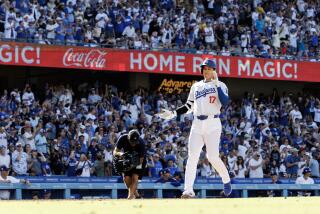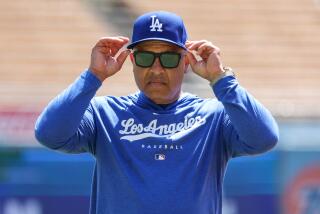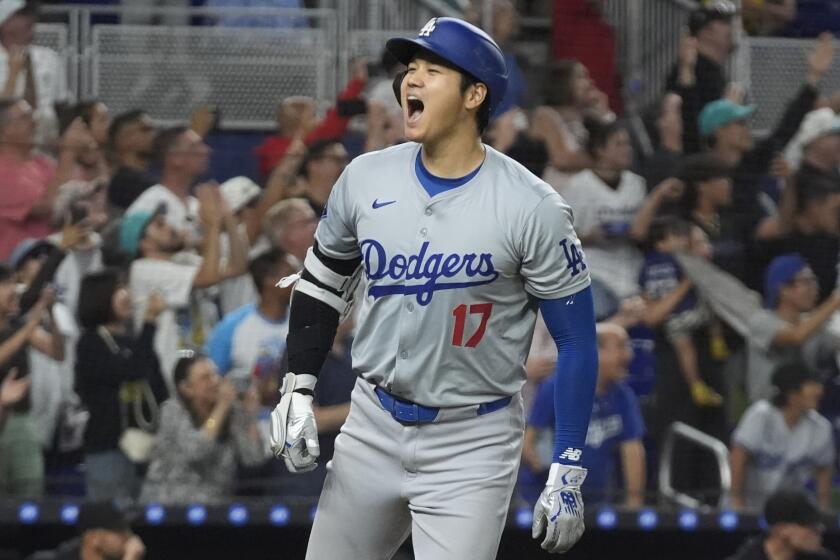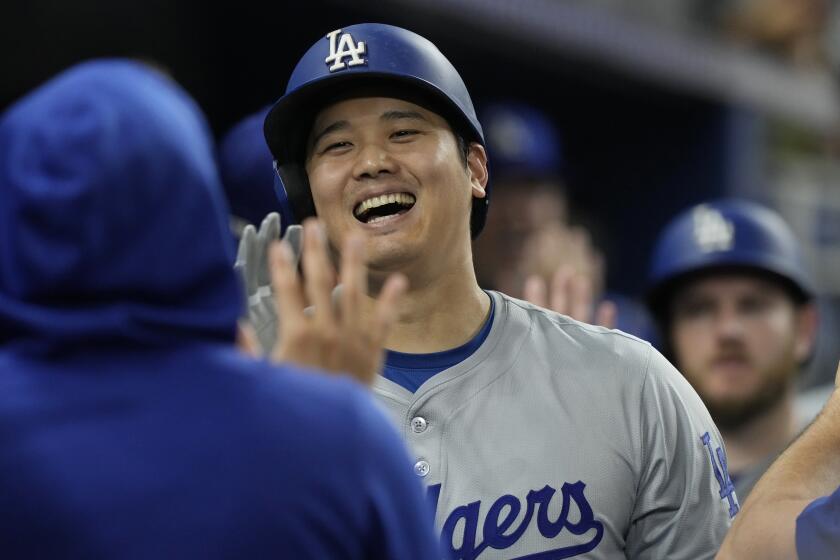Troy Tulowitzki’s status puts Rockies GM Jeff Bridich in a bind
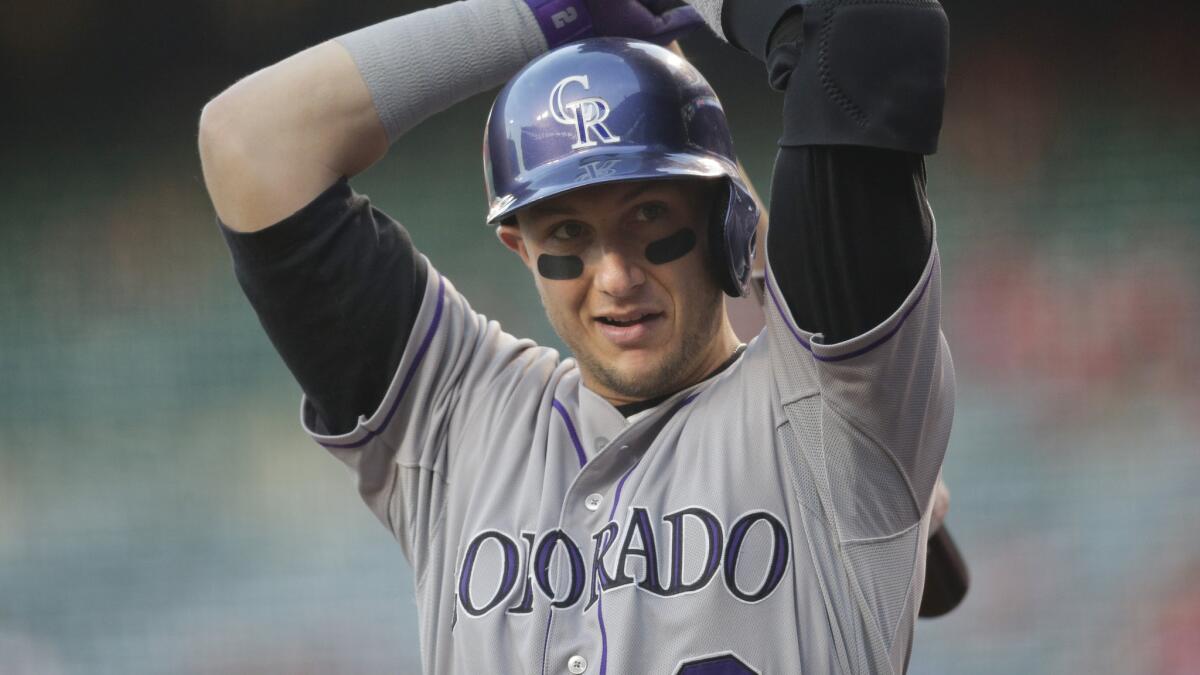
Colorado Rockies shortstop
You have to feel for Jeff Bridich.
He is six weeks into his first season as general manager of the Colorado Rockies, a team that has finished at least 18 games out of first place four years running. In the middle of an 11-game losing streak, the agent for franchise player Troy Tulowitzki said the time had come to discuss whether to ask for a trade. Then Dan O’Dowd, the former Colorado GM who signed Tulowitzki to the 10-year, $158-million contract that would complicate any trade, wrote a column suggesting the Rockies deal their star shortstop.
When Bridich spoke up Friday, he played the “blame the media” card.
“Most of the media likes to create news,” he said, “to try to create salacious stories and create controversy instead of report on news. I think that is an elemental part of what is going on here.”
Bridich was reminded the stories were based on an on-the-record quote from Paul Cohen, the agent for Tulowitzki, who told the New York Post he would meet with Tulowitzki on Thursday to talk about whether to ask out of Colorado.
“To say that is not a possibility would be silly,” Cohen said.
Said Bridich: “That same possibility existed in the winter time. That same possibility existed in spring training. That same possibility existed in April. That same possibility existed 24 hours before he was asked that question.”
But then the season started. Memorial Day is not yet here, and the Rockies already are 9 1/2 games out of first place, and that is with the rare combination of a healthy Tulowitzki (.292 on-base percentage) and a healthy Carlos Gonzalez (.261 OBP).
Bottom line: Tulowitzki could have said he has no interest in playing elsewhere. He did not. Bridich could have said he will not trade Tulowitzki. He did not.
The Angels would have been a perfect fit for Tulowitzki, a former Long Beach State teammate of Jered Weaver, if not for the ongoing Josh Hamilton disaster. Tulowitzki could have been a long-term solution at shortstop or third base, but the Hamilton contract forced General Manager Jerry Dipoto to trade bats to get the affordable young pitching he so desperately needed, and that is what he would have to trade to land Tulowitzki.
The Dodgers are intrigued with the idea of Tulowitzki and Corey Seager manning the left side of their infield for years to come, even with Alex Guerrero and Hector Olivera on hand. It is difficult to imagine the Rockies trading Tulowitzki to their rich division rivals, but it is not difficult to imagine the Dodgers getting involved in trade talks anyway, even if they do not get Tulowitzki.
The Dodgers sniffed around the Hamilton trade talks, not because they wanted Hamilton, but because their financial clout would have enabled them to buy a prospect or two while bridging the financial gulf between the Angels and Texas Rangers. The Dodgers doubt they could pull that off if the Rockies do trade Tulowitzki — one Dodgers person called Hamilton a “distressed asset” — but don’t bet against the new and creative front office trying to leverage their economic might that way.
Street smart
Since Huston Street gave up a chance at free agency when he signed a two-year, $18-million extension to stay with the Angels, conventional wisdom says he probably gave up some money too.
He didn’t. The Angels paid the market rate.
Not only could an injury have dampened Street’s value — he has been on the disabled list in four of the five seasons preceding this one — the evolving market for closers could have put Street in significant jeopardy in free agency.
As an increasing number of teams lean toward the sabermetric conclusions that closers are relatively overpriced and the performance of relievers in general is notoriously volatile, the demand for a proven closer diminishes. When demand drops, price generally follows, even amid baseball’s record revenues.
At the same time, teams have spread the wealth to setup men to build a deeper bullpen.
In spring training, Street said he believed his value should fall between two free agents signed last off-season: David Robertson (four years and $46 million with the Chicago White Sox) and Andrew Miller (four years and $36 million with the New York Yankees).
Robertson and Miller each hit free agency at 29. Street, had he filed for free agency this fall, would have hit the market at 32.
Of the 11 free-agent relievers to sign with another team for at least $15 million over the last three off-seasons, three were proven closers: Robertson, Joe Nathan (two years and $20 million with the Detroit Tigers) and Rafael Soriano (two years and $28 million with the Washington Nationals).
Nathan had a 4.81 earned-average last year and is injured this year; Soriano lost his job as the Nationals’ closer at the end of last season and remains unsigned this season.
Of the 10 pitchers with at least 10 saves this season, their salaries this year range from $521,000 (Brad Boxberger of the Tampa Bay Rays) to $9 million (Miller and Craig Kimbrel of the San Diego Padres). Street cashed in, quite nicely.
Pitch-count handcuffs
Corey Kluber was three outs from a one-hit shutout Wednesday, and a glamorous page in the record book. The defending American League Cy Young winner had 18 strikeouts, two shy of tying the major league record for a nine-inning game.
The Cleveland Indians removed him, of course, after the eighth inning. Pitch count, you know. He had 113 pitches.
“If you could promise me you could have a six-pitch inning, yeah, go ahead,” Manager Terry Francona told Cleveland reporters. “This was too easy of a decision.”
That was too easy of an answer. As the Tommy John surgery epidemic rages, it becomes increasingly apparent that pitch counts are not a one-size-fits-all guard against pitcher abuse. What might be appropriate for young pitchers building arm strength and developing careers might not be useful for an in-his-prime Kluber.
Kluber threw more than 113 pitches four times last season, including one start of 120 pitches. His eighth inning Wednesday was not stressful — 12 pitches — and his fastball that was clocked from 91-95 mph all game ranged from 92-94 mph in the eighth inning. His last pitch: 94 mph. He never has been on the disabled list because of an arm injury.
The Indians could have stuck with Kluber without undue risk to his career, not for the shot at history, but for the best chance to win the game. Closer Cody Allen, and his 8.25 ERA, worked the ninth inning to preserve a 2-0 victory over the St. Louis Cardinals.
The Cleveland fans booed when Allen replaced Kluber.
“If I was in the stands,” Allen told reporters, “I probably would’ve been booing too.”
Twitter: @BillShaikin
More to Read
Go beyond the scoreboard
Get the latest on L.A.'s teams in the daily Sports Report newsletter.
You may occasionally receive promotional content from the Los Angeles Times.


